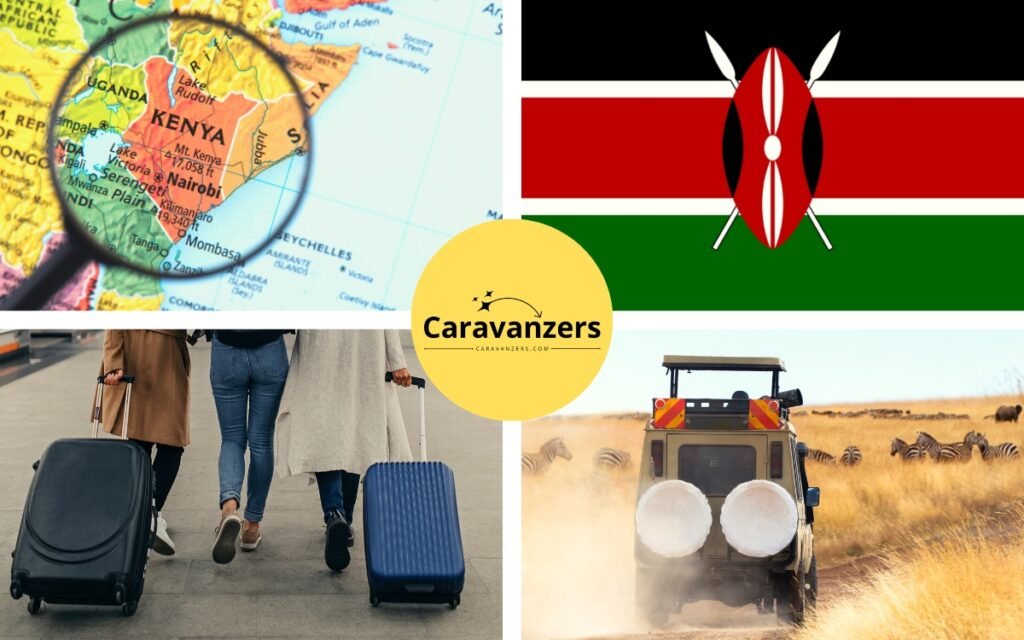
Kenya safari travel offers an awe-inspiring journey of wildlife exploration and cultural immersion in some of the most breathtaking landscapes on the planet.
Kenya’s safari industry plays a vital role in boosting the country’s economy and attracting tourists from all corners of the globe.
The safari experience in Kenya mainly revolves around its national parks and game reserves, which are home to an incredible range of wildlife species, including the world-famous “Big Five” (lion, elephant, buffalo, leopard, and rhinoceros).
In this guide, I’ll take you through the essential steps of planning your trip to Kenya, from arriving in the country to choosing your destinations, activities, accommodations, and meals.
So, let’s go to Kenyan safari!
Kenya Safari Travel Basics

A primary draw for people to embark on a safari is to witness wildlife thriving in its natural environment. Kenya boasts a diverse and flourishing wildlife population, and a safari provides an excellent opportunity to observe creatures like lions, elephants, giraffes, zebras, and many more.
Going on a safari can be a thrilling adventure, particularly for those who revel in the outdoors and the excitement of encountering wildlife up close.
Wildlife photography remains a beloved hobby, and a safari offers a fantastic chance to capture breathtaking images of animals in their habitat.
Numerous safari lodges and camps are situated in remote and tranquil settings, making them a haven to unwind and detach from the demands of daily life.
Many safari destinations, including those in Kenya, allow visitors to immerse themselves in local cultures and customs, providing a fulfilling and enlightening experience.
Is Kenya safe for tourists?
Kenya is generally considered a safe destination for tourists, but like any country, it’s important to take precautions and be aware of potential risks.
Here are some tips to help ensure a safe trip for Kenya safari travel:
Be aware of your surroundings. Pay attention to your surroundings and be aware of any suspicious activity or individuals.
Avoid high-risk areas. Try to avoid areas known for high crime rates, such as certain neighborhoods in major cities.
Use licensed tour operators. Even if it does sound cheaper to go with someone, make sure it is legit. Use licensed tour operators for safaris and other activities to ensure your safety and security.
Keep valuables safe. Your valuables, such as passports, cash, and electronics, should be in a safe place, such as a hotel safe or a secure bag.
Follow local customs. Kenya has its own uniqueness. Be respectful of local customs and traditions, especially when visiting religious sites or interacting with locals.
Stay up to date on travel advisories. Things can drastically change in Kenya very quickly. Check travel advisories from your home country’s government and local sources for up-to-date information on safety and security concerns in Kenya.
Kenya Entry Requirements
The entry requirements for Kenya vary depending on your country of origin and the purpose of your visit. Visitors must have a valid passport with at least six months of validity remaining.
Most travelers require a visa to enter the country, which can be obtained online in advance or on arrival at the airport.
Visitors coming from countries with a risk of yellow fever transmission are required to show proof of yellow fever vaccination. For this and other health requirements, make sure to visit the nearest Kenyan embassy website.
Kenya Airports
Kenya boasts a couple of great airports that cater to domestic, regional, and international flights.
Jomo Kenyatta International Airport is in the capital city of Nairobi. This is the primary international airport in Kenya and serves as the central hub for Kenya Airways. Most safari enthusiasts arrive in Kenya through this airport.
Moi International Airport is situated in Mombasa, is the second-largest international airport in Kenya, and is the primary gateway to the Kenyan coastline and nearby tourist attractions. If you’re looking to hit the beach first, this is an ideal airport.
Wilson Airport, located in Nairobi, is a smaller domestic airport that provides regional flights to various destinations within Kenya and East Africa. If you’re exploring Kenya and its surroundings, this airport is an excellent option.
Safari Destinations in Kenya

There are amazing safari destinations for Kenya safari travel, and you will find something that works for you. I will mention some of the ones that I really like.
Masai Mara National Reserve is one of the most popular safari destinations in Kenya, known for its annual wildebeest migration, which is a sight to behold.
Amboseli National Park is famous for its large herds of elephants and stunning views of Mount Kilimanjaro.
Samburu National Reserve is home to unique wildlife species such as the reticulated giraffe, Grevy’s zebra, and Somali ostrich.
Tsavo National Park is one of the largest national parks in Kenya and is known for its diverse wildlife and beautiful landscapes.
Lake Nakuru National Park is a bird lover’s paradise, with over 400 species of birds, including the famous flamingos.
So, figure out the ones you want to visit and make those plans today!
Where to Stay on a Safari
There are many great places to stay when on a safari in Kenya, depending on your preferences, budget, and the specific parks or reserves you plan to visit.
Kenya has many high-end lodges that offer luxurious accommodations and amenities, including private villas, spas, and gourmet restaurants. Some popular luxury lodges include the Mara Serena Safari Lodge, Ol Donyo Lodge, and Angama Mara.
There are also many mid-range lodges in Kenya that offer comfortable accommodations and basic amenities, including restaurants and swimming pools. Talk to your safari tour operator to figure out which ones you want to stay at.
Tented camps are a popular option for visitors who want a more immersive safari experience. Many of these camps are located in remote areas of the parks and reserves and offer comfortable tents with en-suite bathrooms and outdoor showers.
For visitors who want to minimize their impact on the environment, there are many eco-lodges in Kenya that use sustainable practices and offer eco-friendly accommodations.
There are tons of great places to stay during your safari trip!
What to Eat to Stay Safe on a Safari
To keep yourself from getting sick during your Kenyan safari adventure, you must be mindful of what you eat. Here are some food types that are generally considered safe…
Fresh fruits and veggies – Fresh produce is a great source of nutrients, but be sure to wash them thoroughly with clean water before eating.
Well-cooked meat – Always make sure that meat is cooked thoroughly to avoid bacterial infections.
Bottled water – Drinking only bottled water or filtered and treated water can help prevent water-borne illnesses.
Hot beverages – Hot tea and coffee are safe to drink as the high temperature helps kill bacteria.
Pre-packaged snacks – Nuts, crackers, and energy bars can be great on-the-go snacks.
It’s also recommended that you avoid eating street food and stick to reputable restaurants and lodges.
Before traveling to Kenya, consult with your healthcare provider to ensure that you have received all necessary vaccinations and medications.
Kenya Safari Travel – Final Thoughts
I absolutely adore Kenya – it’s one of my top picks. This beautiful country is a haven for adventure seekers and safari enthusiasts alike.
Its breathtaking scenery, rich cultural heritage, and abundant wildlife offer an unforgettable experience that will stay with you forever.
As you’ve learned from this guide, planning is key to a successful and safe safari trip, from selecting your lodging to being cautious about what you eat.
I trust that this guide has given you useful insights and ignited your excitement for your upcoming safari expedition in Kenya.
AJ Paris is a travel photographer based in New York. He is the editor of Caravanzers.
More Kenya
Here are more articles for you:
Kenya Official – Learn more about Kenya by visiting the official tourism website.
